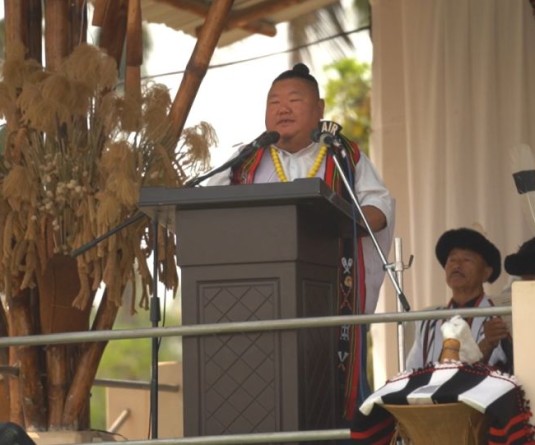
NNC/FGN opposes move to end FMR, build fence along Indo-Myanmar border
DIMAPUR, APRIL 22 (MExN): The NNC/FGN have expressed strong opposition to the Government of India’s decision to terminate the Free Movement Regime (FMR) and construct a physical fence along the Indo-Myanmar border, calling it a direct assault on the identity and historical rights of the Naga people.
In a statement issued on Tuesday, the NNC/FGN asserted that the proposed move disregards the lived realities of the Naga people and fails to recognize the long-standing trans-border ties that bind communities on both sides of the artificial boundary.
“The arbitrary border drawn without the consent of our people has no moral or political legitimacy,” the statement declared, adding that the proposed fencing further entrenches colonial-era divisions that the Naga people have never accepted.
The Indo-Myanmar boundary, which spans approximately 1,643 kilometers, cuts across the ancestral lands of several indigenous communities. On the Indian side, it touches Arunachal Pradesh, Nagaland, Manipur, and Mizoram, while on the Myanmar side it runs through Kachin State, Sagaing Region, and Chin State. For many communities living in this region, the border remains more a colonial imposition than a legitimate demarcation.
The NNC/FGN traced the origins of the border to colonial agreements such as the Treaty of Yandaboo (1826) and subsequent boundary lines drawn during British rule, including the Pemberton and Johnstone lines. These lines, the NNC/FGN argued, were designed for administrative convenience, with little regard for the indigenous people who lived along the frontier.
“From time immemorial, the Naga people have governed themselves through their own institutions, customary laws and collective decision-making processes,” the statement noted. “To now enforce a fence over our homeland is not merely a logistical act—it is a continuation of political denial.”
The Free Movement Regime, initially formalized under the Burma Passport Rules of 1948 and reciprocated by India in 1950, allowed indigenous communities to cross the border within a 40-kilometer radius without formal documentation. Over time, the scope of the FMR was narrowed, culminating in a bilateral agreement in 2018 that restricted travel to within 16 kilometers and introduced border passes valid for 14 days.
Despite these regulatory measures, communities have continued to move across the border for trade, family ties, and cultural exchanges. The border remains porous, with over 250 villages and an estimated 300,000 people living within 10 kilometers of the frontier, it pointed out.
“Therefore, the Nagas do not accept the border that has been imposed upon our ancestral homeland-an arbitrary line drawn without our consent, against our will, and in complete disregard for our history, identity and nationhood,” the statement further read.
Calling for an “inclusive dialogue grounded in mutual respect and self-determination,” the NNC/FGN emphasized that a lasting solution lies not in reinforcing colonial-era boundaries, but in recognizing the political aspirations and historical rights of the Naga people.
“Any attempt to fence this border-absent a sincere effort to address the underlying historical and political injustices faced by the Naga people cannot be accepted under any circumstances,” the NNC/FGN stated.
“The solution lies in the recognition of our political rights and aspirations as a free sovereign people. Only then can there be a path to real peace-one that honors our history, acknowledges the injustices done to us, and respects our right to determine our own future.”






